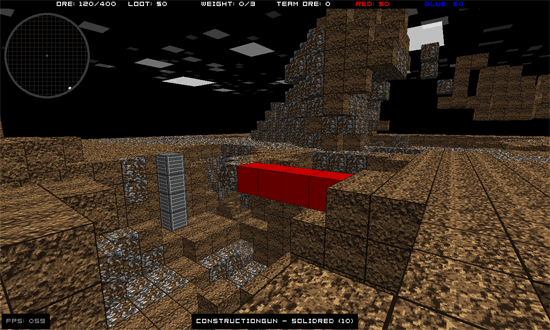It’s a game about mining, and building, and blocks – lots of blocks!
It’s also 3D, and is multiplayer over a LAN or the internet!
And it will be finished shortly!
Coming Soon… Infiniminer!
Zachtronics Industries – Now Hiring!
I know what you’re thinking. “Hiring? In this economy?* You don’t even sell anything!” Okay, so perhaps “hiring” is the wrong word.
For the most part, Zachtronics Industries is a one man team – me. I’m a capable programmer, but if you’ve seen anything I’ve made you’ll know that my art skills are lacking. Thus, I’m looking for an artist.
Candidates should be:
- creative,
- able to create 2D art that is better than what I can make,
- comfortable with pixel art, cartooning, and general illustration,
- familiar with the style of my games,
- reliable, available (IM), and relatively quick with turnaround (days, not months),
- flexible, as I don’t necessarily finish every project I start,
- okay with not making any money from this – I make games as a labor of love!
If you’re interested, contact me by email (zachbarth@gmail.com) or AIM (thekrispykremlin) and we can talk about more specific details. I have a project that I’m knee-deep in at the moment and need some art for, so we can get right to work!
*Hearing people use the phrase “in this economy” makes me want to kill myself.
SpriteModels, or why I don’t make 3D games
I make a lot of 2D games, both because I prefer the aesthetic and find them simpler than 3D, but also because I’m completely incapable of using 3D modeling programs. Thus, for an ongoing 3D work-in-progress, I developed the SpriteModel.
There’s a glut of sprites for a program called “RPG Maker” available online, most of which follow a graphical format similar to the following, which I believe was ripped from a Final Fantasy game:

which can then be un-cleverly rendered like this:
![]()
if you draw them as textured quads that face either with or perpendicular to a rotation angle based on the angle between the quad and the camera.
![]()
It’s similar to the rendering technique used for enemies in early 3D games like Wolfenstein, Doom, and Dark Forces, but looks deliberately more like a sprite rendered in 3D.
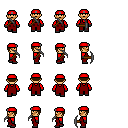
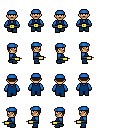
I might be working on a game about mining…
WOW! WORK FROM HOME AND MAKE MONEY ONLINE!
When a few of you suggested I put my Flash games on Kongregate, I was skeptical at first. For all of you not familiar with Kongregate, it’s a Flash game site where you upload your games and are paid a portion of the revenue that they receive from the ads on their site. It starts at 25%, goes up to 40% if your game is exclusive to their site, and ratchets up to 50% if you implement their API. Additionally, they have weekly and monthly contests with fairly significant cash prizes, with the top prizes being $250 for the weekly contests and $1500 for the monthly contest.
Before posting Bureau of Steam Engineering, my first Flash game, I decided that whatever little money I made I would donate to charity; after all, Kongregate doesn’t even pay out until you’ve earned over $25, so it wasn’t likely I’d make anything. While BSE didn’t fail, it didn’t exactly flourish; to this day I’ve only made about $37 from it. The Codex of Alchemical Engineering, on the other hand, did a little better, bringing in around $300 by mid January, in addition to the $250 I won in the weekly contest at the end of December. Needless to say, I was quite surprised.
It took me a long time to find a suitable charity, but in the end I settled on Freedom from Hunger. From their website:
“Freedom from Hunger brings innovative and sustainable self-help solutions to the fight against chronic hunger and poverty. Together with local partners, we equip families with resources they need to build futures of health, hope and dignity.”
They’re big on microcredit (since 1988!), and tie it to education and health support to help the borrowers succeed, with the goal of bootstrapping people out of poverty. They’re also not very large, so I like to think the money might mean more to them than a larger charity.
I received the January payment from Kongregate today and fired off a $500 donation to Freedom from Hunger, which when combined with my job’s charity matching program, resulted in a whoppingly awesome $1,000 donation. I want to thank you guys for playing my games and giving me a reason to make them, as well as suggesting I put them on Kongregate in the first place.
Magnum Opus Challenge
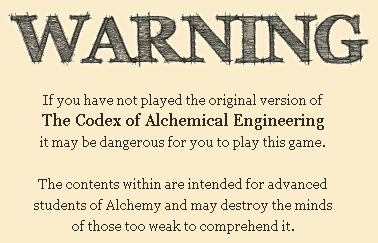
Launch The Codex of Alchemical Engineering :: Magnum Opus Challenge (640×480)
If you haven’t played The Codex of Alchemical Engineering you definitely do not want to play this game. It will destroy you.
A few notes about the game:
- This time around, all levels are unlocked; they will be marked as you complete them and can be done in any order.
- The music playing this time is Greendjohn’s “Nights and Day”, which you can find here on jamendo.com.
- v1.01: Fixed bug that deleted Baron Wheels when loading in a design.
- v1.02: Fixed typo on level select screen and enabled dropping Glyphs and Manipulators behind Baron Wheels.
Magnum Opus Challenge!
Lots of people have requested a level editor for The Codex of Alchemical Engineering. I am not going to make one. I will, however, do something better:
ANNOUNCING: THE MAGNUM OPUS CHALLENGE!
Here’s the details – design a level for CoAE in some sort of graphics program using the following sprites: codex_sprites.zip. You may not add any new user components, such as manipulators or glyphs, and you may not add any new kinds of atoms, but you may design new things found in the level, such as new kinds of permanent glyphs or a new kind of objective glyph. If I get around 10 or more level designs I will create a MAGNUM OPUS CHALLENGE EDITION of the game and put it places where people can play.
Edit: I’m going to replace the Glyph of Duplication with something that’s a little more useful, so feel free to also submit ideas for a new user-glyph along with your puzzle(s) that encourage it to be used. If no one suggests anything useful I’ll probably go with a Glyph of Reduction that down-converts metals while emitting a Mercury atom in the process.
When submitting a level, make sure you add the creative flavor – your compound should have a name that both fits with the alchemical theme and can be connected to the actual compound that the player will be creating in your level. Feel free to suggest text for notes if you’re introducing anything that needs introduction. And, if you’re making a level with a fantastic compound like Alcahest, the challenge of playing your level should be equally epic. A technical note: as it currently stands, the engine requires that all adjacent atoms in a compound be linked together; while I could rewrite parts of the engine to “fix” this, I’d rather keep working on my new game instead.
Whoever submits the most clever, well thought out, and generally Codex-like level might win a prize, provided I can find my t-shirt stenciling equipment.
Please send all submissions to zachbarth@gmail.com; if you have a question, ask it in the comments. Entries are due February 1st, 2009.
CoAE on Kongregate
I’ve uploaded The Codex of Alchemical Engineering to Kongregate; you can play it here. One neat thing that the Kongregate version has that this does not is achievements, which for now are limited to the total number of symbols used for each level and the total running time for each level. If you’re interested in getting your competitive Alchemy skills on, head over to Kongregate and kick some ass.
Alchemical Engineering
I present to you, the loyal readers, my latest (and last, for a while) Game for Engineers:
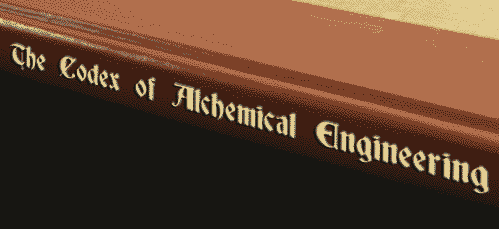
Launch The Codex of Alchemical Engineering (640×480)
Those of you who have played Manufactoid will recognize that this game is essentially the same concept, except for one small caveat: there’s no programming required! Many people were unable or unwilling to play Manufactoid because of the programming requirements; The Codex of Alchemical Engineering instead requires you to program robotic manipulator arms with a set of symbols that control its motion. This game also builds on the converter aspect of Manufactoid by employing multiple Glyphs that perform various transformations, contrasted with Manufactoid’s mono-purpose converters that were entirely level-specific. There’s not a lot more that needs to be said, as all instructions are provided in-game, so go play it now!
Feel free to post your solutions in the comments, so long as you don’t write anything spoilerific that could ruin the game for other players. I’m not sure how you could really spoil anything about the game, though, but don’t take that as a challenge.
A few notes about the game:
- After completing a level, your progress is saved so long as your Flash “cookies” aren’t deleted. Your design, however, is not; if you want to keep your design, you must go to the Save screen and save the text shown there (I keep my solutions in a text file on my desktop). You can reload a saved design by pasting the design code into the Load window and pressing the load button.
- The music playing is Evan’s “Rever… Peut-etre…”, which you can find here on jamendo.com.
Random Update
Not a lot going on here; I’m slowly working on a new game and playing a little too much Fallout 3 in the meantime.
I was alerted to a bug in the Ruckingenur Editor, where RUCK_WriteDebug was adding 1 to the pointId when it should have been adding one to the registerIndex. I’ve updated the executable and API docs and uploaded a new zip; you can find it here. I’m waiting to hear back from a few of the people who submitted levels, but there should be some more Ruckingenur coming to you guys eventually…
BSE on Kongregate
Two days ago, and in the name of science, I uploaded Bureau of Steam Engineering to Kongregate. It’s been an interesting experience, to say the least.
I have to say, though – you guys are champs. I make games, you play them, and everyone is generally happy. Less so on Kongregate, although the overall response was pretty good.
I’ve “earned” about $10 via their ad-revenue sharing program so far; from what I understand, once it reaches $25 they’ll send me a check that I can cash and donate. Does anyone know of a good micro-lending charity? Preferably one with a low overhead and a good understanding of economic incentives…

